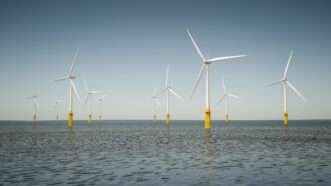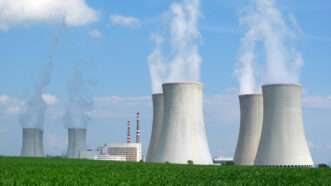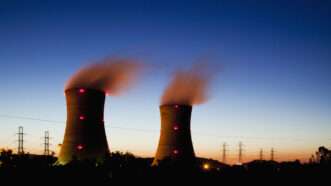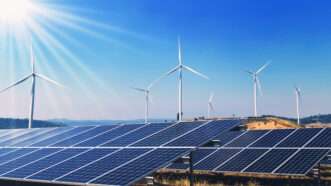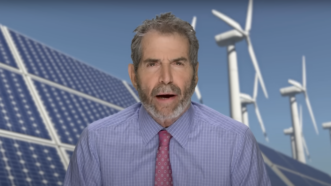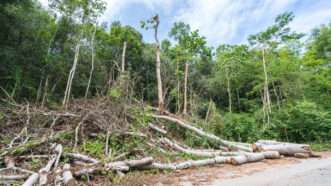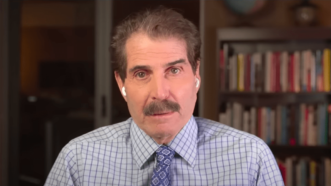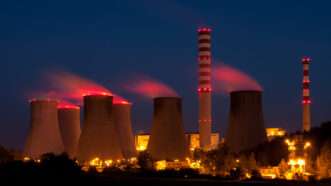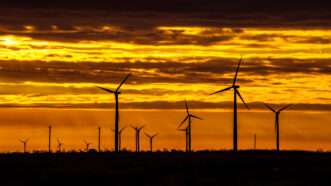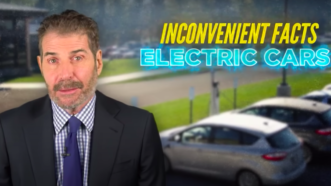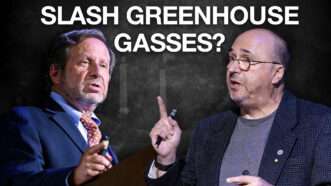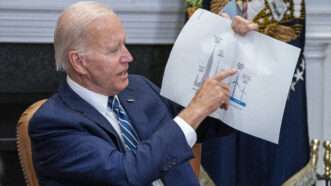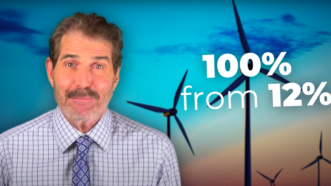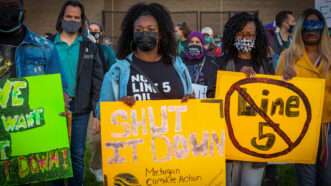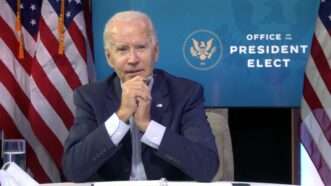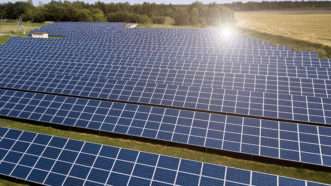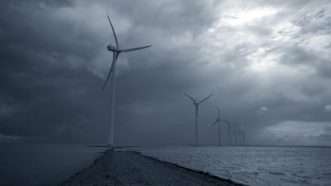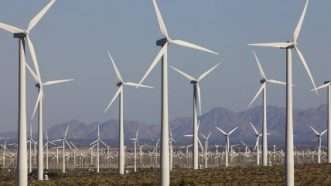Wind Power
Court Blocks Trump's Ban on Wind Power, but Other Anti-Renewable Policies Remain
Trump isn’t the first president to pick energy winners and losers, but he should be the last.
17 States Sue Trump Administration for Its Anti-Wind Energy Policy
The lawsuit challenges a Day 1 executive order signed by the president to halt federal leasing for offshore wind energy projects.
Celebrate Earth Day by Going Nuclear
Sunbeams and breezes are too fickle. The most climate-friendly power source is using magic rocks to boil water.
We're Not Short on Power. We're Just Too Sanctimonious To Generate It.
Northeastern states import massive amounts of electricity from Canada while strangling domestic energy production with regulations.
We Need More Three Mile Islands
As tech companies reboot nuclear energy, the site of the famous meltdown represents both the industry’s demise and its rebirth.
Many Native Americans Struggle With Poverty. Easing Energy Regulations Could Help.
A significant percentage of Native Americans don't even have electricity—thanks in part to reservations being subject to overwhelming bureaucracy.
How Reliable Is America's Electrical Grid?
Coal and natural gas are more reliable but they can't compete with massively subsidized wind and solar. That's a problem.
This Activist Push To Destroy Dams Won't Save Fish—but It Will Waste Resources
Some politicians and environmentalists want to tear down Snake River dams in Washington state, even though they generate tons of electricity.
Missouri Bill Would Ban Eminent Domain, but Only for Wind and Solar Projects
The Show Me State has plenty of room to rein in laws on taking private property, but instead, lawmakers are focusing only on one very narrow use case.
Here's Why Government Should Stop Throwing Money at Green Energy
In California, which has a slew of renewable energy regulations, the cost of electricity increased three times faster than in the rest of the U.S.—and the state still doesn't even get reliable energy.
Federal Shipping Regulations Sank One of America's Biggest Offshore Wind Projects
Yup, blame the Jones Act. Again.
Bill Maher Attacks 'the Real Deep State' of Government Regulators, Administrators, and Zoning Officers
The comedian blames America's endless reams of regulatory red tape for slowing down new wind farms, housing, and public toilets.
New Study: Nuclear Power Is Humanity's Greenest Energy Option
Land-hungry biomass, wind, and solar power are set to occupy an area equivalent of the size of the European Union by 2050.
The Push To Eliminate Fossil Fuels Is Hurting Poor People
"When we look at solar and wind around the world, it always correlates to rising prices and declining reliability."
Energy Abundance Is Liberating Humanity From Grueling Labor
Robert Zubrin’s The Case for Nukes highlights the connection between energy and freedom.
Democrats Say They Support Green Energy. Why Do Their Policies Say Otherwise?
If you look closely, you'll find a lot of contradictions.
Electric Cars Are Good, but We Still Need Fossil Fuels
"Engineers are really good at making things better, but they can't make them better than the laws of physics permit."
Driving Electric Cars Produces Little Carbon. Making the Batteries Produces a Lot.
Many politicians who want to ban gas-powered vehicles appear to misunderstand the science.
New York Wind Project Drops Federal Funding To Avoid Federal Permitting Headaches
The Port of Albany will forgo more than $29 million in federal funding for the delayed $300 million project.
Does Climate Science Really Compel Us Toward Urgent Action?
Climate scientist Andrew Dessler of Texas A&M University defends urgent action on climate against scientist and author Steven Koonin.
Do We Need to Rapidly Convert to Renewables To Save the Planet? A Soho Forum Debate
Texas A&M University's Andrew Dessler vs. Steven Koonin, former undersecretary for science at the Department of Energy
The Biggest Obstacle To Building Offshore Wind Farms Is Government
America gets about 42 megawatts of power from offshore wind. Another 18,000 megawatts are currently tied up in permitting battles.
How a Massachusetts Power Plant Illustrates America's Fraught Shift to Green Energy
Brayton Point was a coal-fired plant that tried to clean up its act. Protesters and politicians demanded its closure. A new offshore wind project won't be sufficient to replace it.
The Case for Tradeable Permits in Dead Birds
A push toward wind energy threatens to kill more eagles. Markets can help.
President Biden Asserts 'Climate Change Is an Emergency'
But does not declare that it is a "national emergency."
Elected Leaders Daydream About Being Dictators. They Shouldn't.
"If government is big enough to give you anything, it's big enough to take everything away from you."
'Green' Germany Prepares To Fire Up the Coal Furnaces
Strongly held wishes and pixie dust won’t deliver a green utopia.
Fossil Fuels Save Lives
Over the last 100 years, we've seen a 98 percent decrease in climate-related deaths. You can thank fossil fuels.
Are Biden Administration's Offshore Wind Plans Just a Fantasy?
Without attention to the onerous permitting process for offshore wind and other energy projects, efforts will be plagued by costly delays.
Restricting Reliable Energy Sources Is Expensive and Dangerous
Pipelines work, while solar and wind energy often leave people in the dark.
The Texas Blackout Blame Game
Neither wind power nor deregulation are responsible for the Texas power disaster.
Renewable Energy Is Not the Chief Cause of Texas' Power Outages
The vast majority of the shortfall is from failures at fossil fuel-powered plants.
Biden's '100% Clean Energy Economy' Will Require Huge Trade-Offs
Campaign promises about green energy often obscure real-world constraints.
Is 'King Solar' Now the Cheapest Electricity Source Ever?
Yes, and it's only going to get cheaper.
How California's Environmental Mandates Led to Blackouts
Critics say the state's dependence on solar and wind have made the power grid unreliable and overly expensive.
Good News for Birds (and Wind Power)
Something as simple as black paint may reduce avian mortalities from wind power.
Biden's New Green New Deal Is the Same as the Old Green New Deal
It's uncanny how solving climate change just happens to require the progressives' longstanding economic agenda.
Tax Reform Fight Shows Why Subsidies Never Die
The House wanted to scale back an expensive wind energy subsidy, but the Senate prefers to preserve the status quo.
Energy Secretary Rick Perry Orders Regulators to Figure Out How to Keep Renewables from Crashing the Electric Power Grid
New energy market distortions to fix old energy market distortions
Powering U.S. Using 100 Percent Renewable Energy Is a Total Fantasy
New research debunks a study claiming there's a low-cost way to power America using only wind, solar, and hydropower.
The Coming German Energy Crisis
An overcommitment to renewables has already had negative consequences.
Solar and Wind Power Won't Work Without Natural Gas as a Back-Up, Says New Study
To be against fracking is to be against renewable energy.
Anti-Fracking Activism Sacrifices Nature for Ideology, Correctly Argues USA Today Op/Ed
Reason warned back in 2011 that environmentalists would oppose cheap natural gas
Senate: If Wind Power Is Already Competitive Why Does It Need More Subsidies?
Smart unsubsidized private investments in renewable power resources might increase the energy independence of the United States



